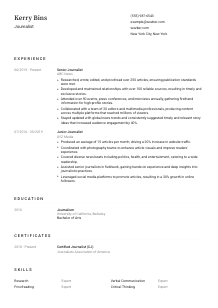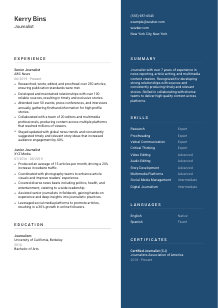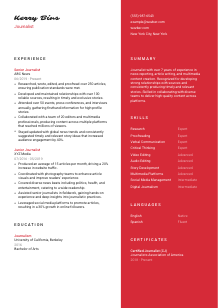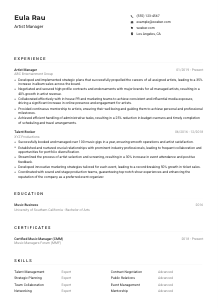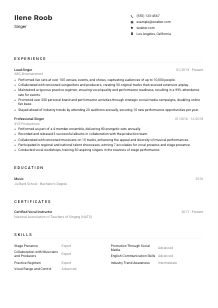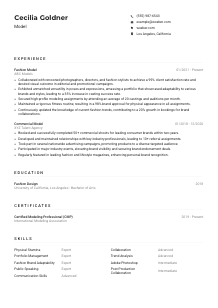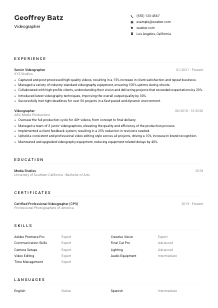Journalist Resume Example
Chasing stories, but your resume feels unpublished? Dive into this Journalist resume example, shaped with Wozber free resume builder. Uncover how effortlessly you can ink your investigative insights to meet editorial standards, turning your career narrative into tomorrow's must-read!
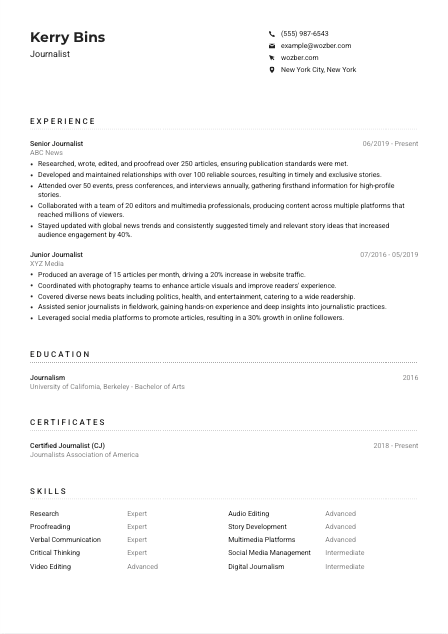
How to write a Journalist resume?
Hello, aspiring Journalist! The quest to capture stories and present them compellingly is both noble and demanding. In the bustling journalism field, crafting a standout resume is as crucial as penning a headline-making story. Gone are the days of one-size-fits-all resumes.
Today, using tools like the free resume builder, Wozber, and understanding how to optimize for Applicant Tracking Systems (ATS) can set your application apart. This guide is your roadmap to moulding your resume into a narrative as engaging as your articles, tailored precisely for that Journalist position you're eyeing.
Personal Details
Let's begin with the Personal Details - the opening lines of your story. These details are not merely formalities but narrate the 'where' and 'who' of you, setting the stage for your professional tale as a Journalist.
1. Sign Your Byline
Your name is the headline of your resume. Make it prominent. Using a readable font that stands out asserts your identity. Imagine your name in print, leading the front page; that's the impact you want.
2. Identify Your Beat
"Journalist" - placing the job title immediately informs the hiring manager of your career narrative's direction. It's like choosing the right section for your article in a newspaper.
3. Essential Contact Channels
Your phone number and a professional email format (firstname.lastname@email.com) serve as the bridge for further conversations. Ensuring these are correct and professional is akin to verifying sources for your stories.
4. Report From the Right Location
Stating "New York City, New York" not only aligns with the specified requirement but reassures employers of your availability and readiness, eliminating any concerns about relocation expenses.
5. Your Digital Footprint
A LinkedIn profile or a personal portfolio site can be like your published work archive. Make sure they are current and reflect your resume, adding depth to your application.
Takeaway
This section is your handshake with the hiring manager. Keeping it neat, professional, and aligned with the role sets the tone for the narrative journey ahead. Let it reflect your personality, within professional boundaries.





Experience
The Experience section is the core of your resume, a compelling anthology of your journalistic endeavors. Let it highlight your contributions, big and small, to the world of media.
- Researched, wrote, edited, and proofread over 250 articles, ensuring publication standards were met.
- Developed and maintained relationships with over 100 reliable sources, resulting in timely and exclusive stories.
- Attended over 50 events, press conferences, and interviews annually, gathering firsthand information for high‑profile stories.
- Collaborated with a team of 20 editors and multimedia professionals, producing content across multiple platforms that reached millions of viewers.
- Stayed updated with global news trends and consistently suggested timely and relevant story ideas that increased audience engagement by 40%.
- Produced an average of 15 articles per month, driving a 20% increase in website traffic.
- Coordinated with photography teams to enhance article visuals and improve readers' experience.
- Covered diverse news beats including politics, health, and entertainment, catering to a wide readership.
- Assisted senior journalists in fieldwork, gaining hands‑on experience and deep insights into journalistic practices.
- Leveraged social media platforms to promote articles, resulting in a 30% growth in online followers.
1. Highlight the Plot Points
Dissect the job description to understand the script the employer has in mind. The key actions and achievements in your past roles should echo these plot points. For instance, "Researched, wrote, edited, and proofread over 250 articles," directly caters to their need for an experienced writer.
2. Setting the Scene
List your roles chronologically, starting with the most recent. Detailing your journey from a "Junior Journalist" to a "Senior Journalist" offers a narrative arc to your career story.
3. Character Development
Share achievements that showcase growth and impact. Mentioning the diversity of your roles, like covering different beats or using multimedia tools, demonstrates your versatility. Remember, specific examples carry more weight, such as "Developed and maintained relationships with over 100 reliable sources."
4. Quantifying Your Chronicles
Use numbers to lend scale and substance to your story, like the audience reach of your pieces or the percentage increase in readership or engagement due to your stories.
5. Relevance Is Key
Keep the plot focused. If an experience didn't refine your skills as a Journalist or doesn't relate to storytelling, editing, or researching, it might be better left in the drafts.
Takeaway
Think of the Experience section as your portfolio; each bullet point is a published piece demonstrating your capabilities. Tailor these stories to meet the role's drumbeat, showcasing not just your ability to fit in but to excel.
Education
Beyond stating facts, your Education section can amplify your voice and readiness for the role. Let's ensure it tells the story of a dedicated learner, well-equipped to engage in journalistic endeavors.
1. Identify the Degree to Spotlight
Link your education directly to the job's requirements. Presenting your "Bachelor of Arts in Journalism" prominently meets their call for relevant educational background.
2. How to Enlighten
Keep your educational background clear and to the point, not unlike writing a lead. The essential details are your degree, institution, and year of graduation.
3. Mastering the Subject Matter
Especially for roles demanding specific expertise, like journalism, aligning your degree to the job opens up a narrative on your foundational knowledge. For roles demanding a broader set of skills, highlighting relevant courses can also enhance your story.
4. Adding Depth with Relevant Courses or Achievements
For newcomers to the field, distinguishing yourself might include referring to special projects, thesis work, or even relevant extracurriculars that illuminate your passion and dedication to journalism.
5. The Honor Roll
Accolades or honors evidence dedication and achievement. While they may hold more weight at the onset of your career, they can still add a compelling edge to your academic narrative.
Takeaway
Your Education section is not just about the qualifications you've earned but the journey you've embarked on to harness your craft. Leverage it as a testament to your foundation in journalism and your commitment to excellence.
Certificates
In journalism, staying updated and continuously refining your craft is paramount. Certifications bolster your profile, showcasing specialized skills or knowledge areas. Let's navigate through detailing your certifications effectively.
1. Alignment with the Script
Start by scrutinizing the job posting. If certifications aren't directly mentioned, consider industry standards or upcoming trends that might give you an edge, such as digital journalism or multimedia storytelling.
2. The Highlight Reel
"Certified Journalist (CJ) from the Journalists Association of America" speaks volumes. List certifications that affirm your commitment to journalism and skills that align with the job's requirements.
3. Documenting Dates
For certifications with a shelf life or recent achievements, including the date, signals to employers that you are up-to-date with industry standards and ongoing professional development.
4. An Evolving Plotline
The field of journalism is ever-changing. Commitment to learning and adapting through certifications exhibits your dedication to stay relevant and informed, a critical trait for any Journalist.
Takeaway
Think of each certification as a scoop, a testament to your investigative zeal and expertise in your field. They complement your narrative, adding depth to your professional storyline and showcasing your commitment to excellence.
Skills
The Skills section is your chance to highlight the practical tools and soft skills that make you an exceptional Journalist. It's about showing, not telling, how you're equipped for the trenches of journalism.
1. Extracting the Essence
Pour over the job description to understand the explicit and implicit skills desired. For example, "Proficiency in multimedia tools and platforms" translates directly into showcasing your video and audio editing prowess.
2. The Essential Tools
Match your skill set with the job's demand, listing hard skills like multimedia proficiency and research capabilities alongside soft skills such as critical thinking and communication. It's about balancing the technical with the narrative.
3. The Art of Selection
Curate your skills thoughtfully. It's tempting to list every skill under the sun, but relevance wins. Highlighting your social media savvy or digital journalism skills reflects awareness of modern platforms and trends.
Takeaway
Envision your Skills section as your journalistic arsenal – every tool, every skill, is ready for deployment, making stories come alive. Highlighting the right skills assures hiring managers that you're not just ready for the job; you're prepared to excel.
Languages
In a globalized world, languages can be the key to unlocking stories and connecting with audiences. Whether conducting an interview in Spanish or reporting from a multi-lingual beat, let's highlight how linguistic skills can set you apart.
1. Meeting the Basic Requirements
Start by addressing the job's specified language needs. English being "a core requirement" calls for a clear declaration of your proficiency.
2. More Than Just English
Should the job involve international beats or diverse communities, showcasing additional languages like Spanish communicates your capability to engage a wider audience.
3. Broadening Your Audience
Listing other languages you're proficient in, aside from those specified, can highlight your versatility and potential to broaden the publication's reach.
4. Level of Proficiency
Be clear about your language levels. Whether you're a native speaker or fluent, accurately reflecting your proficiency ensures expectations are matched.
5. Understanding the Scope
Consider the role's demands. If it's focused on local stories, emphasis on English might suffice. However, global roles could benefit from showcasing a palette of languages, serving as a testament to your adaptability.
Takeaway
Language skills are not just about communication; they're about connection. They enable you to dive deeper into stories, reach further into communities, and resonate with a broader audience. Embrace your linguistic capabilities as an integral part of your journalistic identity.
Summary
The Summary is your chance to make a strong first impression, much like a compelling lead to a story. It sets the tone, offering a glimpse into your professional narrative. Let's ensure it encapsulates your essence as a Journalist.
1. Capture the Essence
Begin with an overarching statement that encapsulates your professional identity. Think of it as your headline - "Journalist with over 7 years of experience in news reporting, article writing, and multimedia content creation."
2. Highlight Your Scoops
Pinpoint key achievements and skills that align with the job's demands. Demonstrating your ability to "develop strong relationships with sources" and "produce timely and relevant stories" directly speaks to your qualifications.
3. The Brevity of Wit
While it's tempting to detail every accomplishment, remember that this is just the teaser. Keep it concise, aiming for 3-5 punchy lines that invite the reader to delve deeper into your professional journey.
4. Keeping It Fresh
Ensure your summary reflects your current capabilities and career aspirations. It should be a living part of your resume, updated as your story evolves.
Takeaway
Consider your Summary as the opening paragraph of your front-page story. Craft it to grab attention, reflect your professional identity, and leave the reader eager to learn more about you. This is your moment to shine; let your narrative compel the hiring manager to keep reading.
Launching Your Journalist Journey
Congratulations, insightful Journalist! Armed with these tailored strategies, you're now set to craft a resume that doesn't just list your experiences but tells your professional story compellingly. Remember, a resume with Wozber's free resume builder is not just a document; it's a narrative of your championship in journalism, optimized for ATS, ready to captivate your next employer. Dive into the world with your stories; the drafts of your career await their final publication.
The newsroom of your dreams is just a resume away. Happy writing!

- Bachelor's degree in Journalism, Communications, or a related field.
- Minimum of 3 years of experience in journalism or related media roles.
- Proficiency in multimedia tools and platforms, including video and audio editing software.
- Strong research skills and the ability to verify information through reliable sources.
- Exceptional writing, proofreading, and verbal communication skills.
- English language skills are a core requirement.
- Must be located in New York City, New York.
- Research, write, edit, and proofread articles to meet publication standards.
- Develop and maintain relationships with reliable sources and industry professionals for story development.
- Attend events, press conferences, and interviews to gather first-hand information for stories.
- Collaborate with editors and the multimedia team to produce content across multiple platforms.
- Stay updated with the latest news trends and suggest timely and relevant story ideas.





